May 19, 2025 | 16:22 GMT +7
May 19, 2025 | 16:22 GMT +7
Hotline: 0913.378.918
May 19, 2025 | 16:22 GMT +7
Hotline: 0913.378.918
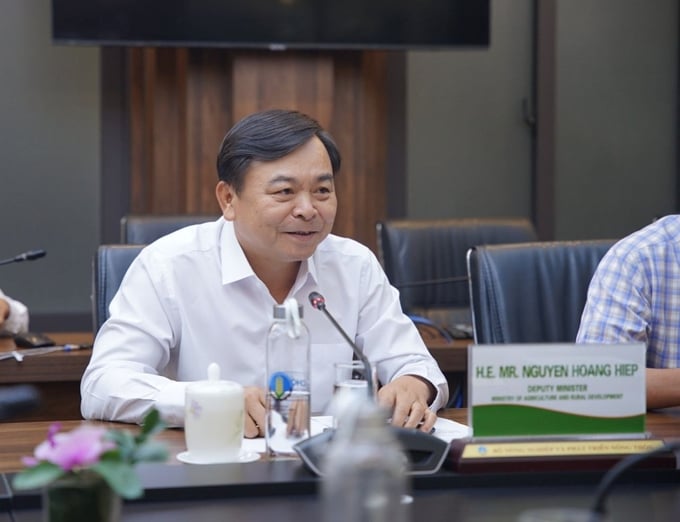
Deputy Minister of Agriculture and Rural Development Nguyen Hoang Hiep speaking at the meeting. Photo: Linh Linh.
Deputy Minister Nguyen Hoang Hiep recognized the robust relationship between the Netherlands and Vietnam in recent years. Vietnam has received substantial support from the Dutch government and numerous Dutch organizations in the areas of water management, agriculture, and water-related risk management.
The Netherlands has effectively supported initiatives in the Mekong Delta, according to Deputy Minister Nguyen Hoang Hiep. The Ministry of Agriculture and Rural Development devised Resolution 120 to address climate change in the Mekong Delta through sustainable development, drawing on Dutch research. This resolution signifies a substantial change in the region's production investment and perspective. In addition, Resolution 120 functions as the fundamental guideline for the Master plan of the Mekong Delta region from 2021 to 2030, with a vision to 2050.
The Royal Haskoning DHV global technical advisory group has provided consulting services for the first time in the approval of a regional plan.
Ms. Meike van Ginneken, the Dutch Water Envoy, underscored the significance of water quality and water resources in the context of agricultural productivity and food security.
The Strategic Partnership Agreement on climate change adaptation and water management between the two countries will mark its 15th anniversary in 2025. This collaboration includes research among institutes, schools, businesses, and social organizations for the mutual benefit of both nations and their people.
Ms. van Ginneken aspires for the long-term sustainability of the partnership between the two nations, with water management serving as the "lifeblood" of the relationship.
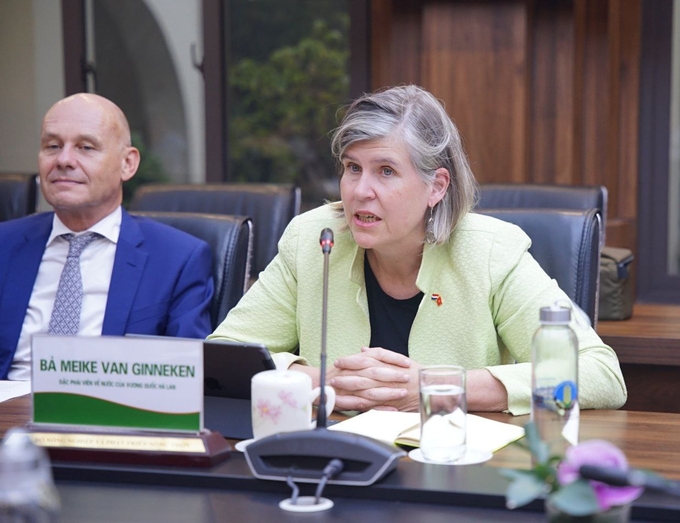
Ms. Meike van Ginneken, Water Envoy of the Netherlands, shares some pilot projects on water sector in the Mekong Delta. Photo: Linh Linh.
She emphasized several pilot projects that the Netherlands is currently implementing in the Mekong Delta, including groundwater management and exploitation projects. These projects are designed to implement Decree 167, which regulates groundwater extraction in freshwater areas by improving land subsidence and groundwater management.
According to Deputy Minister Nguyen Hoan Hiep, water resources are essential for the planning of other sectors in the Mekong Delta Regional Master Plan. He acknowledged the value of fresh, saline, and brackish water. Consequently, the Mekong Delta has been divided into three zones: fresh, brackish, and saline, which correspond to the upper, central, and coastal regions. This method necessitates that economic and agricultural activities adhere to the natural environment.
As per the Deputy Minister, the division of production planning, particularly in agriculture, into three sub-regions is as follows. Nevertheless, several obstacles persist, including the unready of residents to promptly transition to alternative production methods, the unpredictable subsidence and erosion, and the difficulty of stabilizing these areas in light of the fluctuating saline intrusion levels each year.
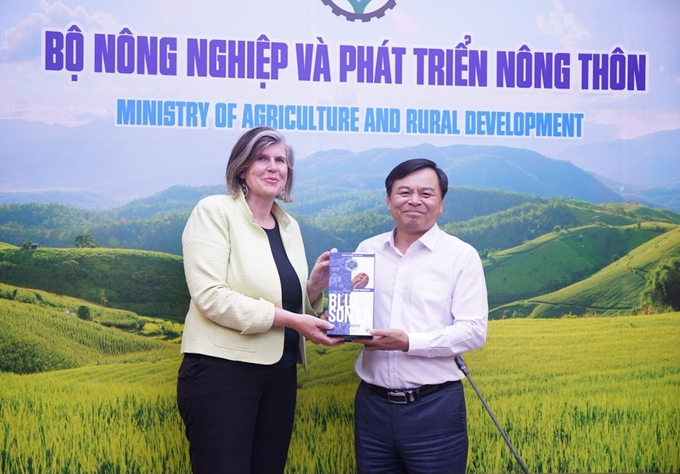
Deputy Minister Nguyen Hoang Hiep presents a souvenir to Ms. Meike van Ginneken, Water Envoy of the Netherlands. Photo: Linh Linh.
Consequently, in order to execute the comprehensive regional plan, it is imperative to establish specific procedures. For instance, the Ministry of Agriculture and Rural Development is working to develop the Project on Prevention of Land Subsidence, Erosion, Flooding, Drought, and Saltwater Intrusion in the Mekong Delta by 2035, with a vision to 2050. Furthermore, resettlement initiatives are available for regions that are susceptible to erosion in the future. There are also proposals to implement a comprehensive mangrove forest reforestation program in the Mekong Delta.
The Deputy Minister of the Netherlands emphasized the importance of continuing to provide technical support and mobilize additional resources from investors, donors, and development partners to support the Mekong Delta and Vietnam as a whole in the implementation of a sustainable agricultural transformation plan for the Mekong Delta region. This will facilitate the advancement of agreements and the strengthening of cooperation in the areas of water and climate change.
Furthermore, he requested that the Netherlands work in close partnership with Vietnam to prepare and promptly initiate the "Mangrove Restoration and Climate Resilience in the Mekong Delta" project, which is supported by a €21 million grant from the Netherlands and an ADB loan of €43 million.
He also expressed a desire for Dutch support in the "Research and Testing Solutions for Coastal Erosion Prevention in the Ca Mau Peninsula - Mekong Delta" initiative, which received a total ODA grant of approximately €10 million.
Additionally, he requested ongoing technical assistance for the MARD's institutions in water management and both structural and non-structural solutions to prevent erosion, sea-level rise, and climate change adaptation.
Translated by Dieu Linh

(VAN) The German Agricultural Society (DLG) explores the possibility of establishing a mechanization service center in Vietnam’s Mekong Delta to support farmers in accessing and utilizing advanced machinery.

(VAN) On May 16, the Department of Water Resources Management, in collaboration with the Food and Agriculture Organization of the United Nations (FAO), held a signing ceremony for the GEF-8 project document.

(VAN) Food safety, mechanization, vocational training, and market opening are key areas of cooperation expected between the Vietnamese Government and the Federal Republic of Germany.

(VAN) Deputy Minister Nguyen Quoc Tri also expressed his hope that Cuba will soon overcome its current challenges, attain food security, and further expand cooperation with Vietnam.

(VAN) The project contributes to enhancing the resilience of communities vulnerable to the impacts of climate change, with a primary focus on local women.
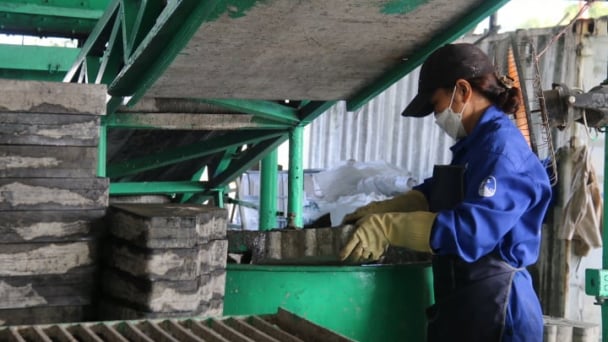
(VAN) Green materials help save energy and resources. However, after more than 10 years, Vietnam has only developed over 200 green buildings with more than 6 million square meters of floor space.
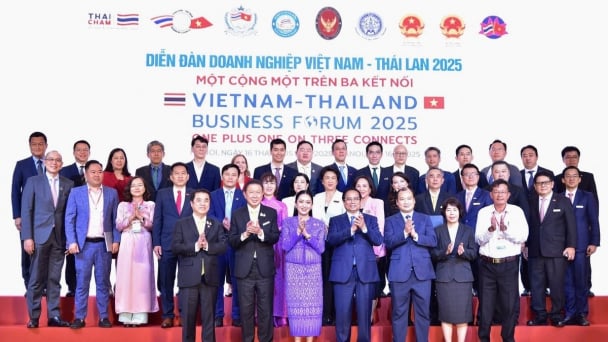
(VAN) Vietnam - Thailand Business Forum 2025: One plus one on three connects, marking a milestone in the comprehensive strategic partnership between the two nations.